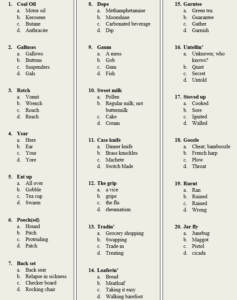The dialect and language of Appalachia is unique. Our way of speaking hearkens back to 1500s Middle English. Some of our words are, arguably, even Old English. (Hit, for example, is, as Wylene P. Dial writes, “the Old English third person singular neuter pronoun for [the word] it . . .”) Much of our speech originated with our Scottish, Irish, German, and English ancestors. We keep their word choices, their inflections, and continue to produce an exceptional diction in timbre-like fashion. In other words, our English is an old, beautiful language.
Nonetheless, Appalachians have been ridiculed for centuries over vernacular or pronunciation or accent or take-your-pick. The fact remains that Appalachian English is still heard in these mountains. Yet, its history, beauty, usage, and relevance are waning.
Local folks are often considered “backward,” an inference deduced somehow from the way we talk or the way we do things. But the people whose Appalachian genealogy can be traced as far back as the 1600s (excepting Native Americans) aren’t differentiated for lineage, and aren’t credited with intelligence or survival or ingenuity. Our language isn’t seen or respected as “once employed by the highest-ranking nobles of the realms of England and Scotland.” The culture and language are ridiculed and maligned.
Some Appalachians, themselves, are embarrassed by the way we talk. Why is this? Well, for one thing, Appalachians have had to work outside our mountains and hollers due to the dearth of job opportunities. We have, therefore, been confronted with what is considered “proper English,” and, consequently, we are heavily pressed to “talk right.”
We aren’t taught about our language and what makes our way of talk so extraordinary. We, instead, learn the Queen’s English, so to speak. For example, as Appalachian English uses a fair share of double negatives (You cain’t not eat), how many of us knew Shakespeare’s writings were peppered with these, and even triple negatives: “I never was nor never shall be,” as Derby says in The Tragedy of Richard the Third.1)Shakespeare, W. (2007). The RSC Shakespeare: William Shakespeare Complete Works. (J. B. Rasmussen, & C. A. Senechal, Eds.) New York: The Modern Library. pg. 1369And how about the word ye once being the proper way to address someone?2) Barber, C., Beal, J. C., & Shaw, P. A. (2009). The English Language: A Historical Introduction 2nd Ed. New York: Cambridge University Press. pgs. 33-34 So, since we haven’t been taught the history of Appalachian English (or the history of Appalachia in general, for that matter), we change our speech to “fit in” as best we can wherever we are. I know this because I’ve done the same thing. Ask any Appalachian who has traveled outside the mountains and he or she will tell you the same.
So – how much do you know about Appalachian English? Appalachia Bare will, from time to time, post quizzes for our readers to find out their knowledge. Take the first in our quiz series and find out the answers on the next post!

**Featured Image Source: pigsels.com
References
| ↑1 | Shakespeare, W. (2007). The RSC Shakespeare: William Shakespeare Complete Works. (J. B. Rasmussen, & C. A. Senechal, Eds.) New York: The Modern Library. pg. 1369 |
|---|---|
| ↑2 | Barber, C., Beal, J. C., & Shaw, P. A. (2009). The English Language: A Historical Introduction 2nd Ed. New York: Cambridge University Press. pgs. 33-34 |

2 Comments